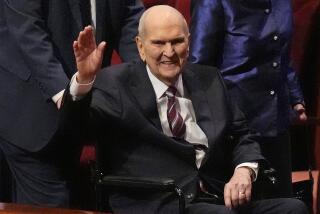AME Leader Rises to Major Challenges
- Share via
TAMPA, Fla. — Years ago, Bishop Adam J. Richardson Jr. led the pep band at Florida A&M; University. Now, as national leader of the African Methodist Episcopal Church, he brings that same “rah-rah” energy for life to his one-year post.
Richardson, 54, was head drum major for the “Marching 100.” To work off stress, the bishop still has a drum pad and sticks in his office, which he will beat away at whenever he is contemplating his next step.
Richardson, invested as president of the AME Bishops Council in a June ceremony in Tampa, has much to contemplate during his term. He oversees the AME Church in the United States and part of South Africa, tackling issues such as AIDS, racial injustice and youth formation. “I bang that drum pad a lot,” Richardson said with a chuckle.
A Tampa native, Richardson began his ministry in Georgia. He spent 18 years at the Bethel AME Church in Tallahassee, Fla., where his energy and community activism caught the attention of church leaders. Chosen a bishop in 1996, Richardson was stationed in South Africa to head the church’s 19th District -- a post he still holds, dividing his time between Florida and Johannesburg.
“He’s eloquent, he’s dynamic and he researches his messages thoroughly,” said Bethel member Mary Newell, who teaches philosophy at Florida A&M; in Tallahassee. As a member of Bethel, she handled public relations for Richardson’s successful campaign for bishop.
The crisis level of HIV infection and AIDS is his main pastoral concern in Africa, the bishop said. At a church conference in Johannesburg in early December, he urged area AME pastors to take a greater role in educating people about the deadly disease.
Armed with “the most up-to-date information” from the conference, the pastors will “get out on the streets and talk about HIV and AIDS to the poor, the prostitutes, anybody who will listen,” Richardson said.
Grass-roots activism is nothing new for Richardson, said Bethel member and Tallahassee resident Gwen Parker. Concerned about the disproportionate number of African Americans in state prisons, Richardson and other Bethel members met with civic leaders several times to discuss the issue, Parker recalled.
Now the bishop is working on a few AME programs to fight racial injustice in a thoroughly Christian way. One project underway is a prison ministry to provide religious counseling for black inmates.
Richardson said he is also proposing that the AME Church create a network of halfway houses for African Americans just released from prison “so that we could also cut down on the high number of black prisoners who are repeat offenders.”
In an age of racial integration and denominational indifference among the youth, Richardson still sees a special role for his historically black church, which was organized by slaves and former slaves in Philadelphia in 1816 after protests over segregation in area churches.
“A lot of our younger members come to church and they just don’t know [the AME Church’s history],” Richardson said. “We need to start classes for these younger members that specialize solely on our history, so that they have a sense of pride about the church.”
More to Read
Sign up for Essential California
The most important California stories and recommendations in your inbox every morning.
You may occasionally receive promotional content from the Los Angeles Times.













